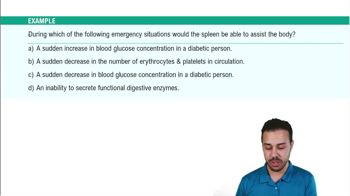Here are the essential concepts you must grasp in order to answer the question correctly.
Diabetes Insipidus
Diabetes Insipidus (DI) is a condition characterized by excessive thirst and the excretion of large amounts of dilute urine. It occurs due to a deficiency of the antidiuretic hormone (ADH), which regulates water balance in the body. In Mr. Jessup's case, his symptoms of excessive thirst and low urine specific gravity suggest that he may be experiencing DI, potentially as a complication following his cerebral surgery.
Recommended video:
Secondary Lymphoid Organs: The Spleen Example 1
Cerebral Surgery Complications
Cerebral surgery can lead to various complications, including damage to the hypothalamus or pituitary gland, which are crucial for hormone regulation. If the surgery affected areas responsible for ADH production or release, it could result in DI. Understanding the anatomical and functional relationships in the brain helps explain how surgical interventions can lead to endocrine disorders.
Recommended video:
Urine Specific Gravity
Urine specific gravity is a measure of the concentration of solutes in urine, indicating the kidney's ability to concentrate urine. A normal specific gravity ranges from 1.005 to 1.030. Mr. Jessup's urine specific gravity of 1.001 indicates very dilute urine, which aligns with the symptoms of DI, as the kidneys are unable to concentrate urine due to insufficient ADH.
Recommended video:
Water’s High Specific Heat
 Elaine N. Marieb, Katja Hoehn 7th Edition
Elaine N. Marieb, Katja Hoehn 7th Edition Ch. 26 Fluid, Electrolyte, and Acid-Base Balance
Ch. 26 Fluid, Electrolyte, and Acid-Base Balance Problem 20
Problem 20 Verified step by step guidance
Verified step by step guidance


